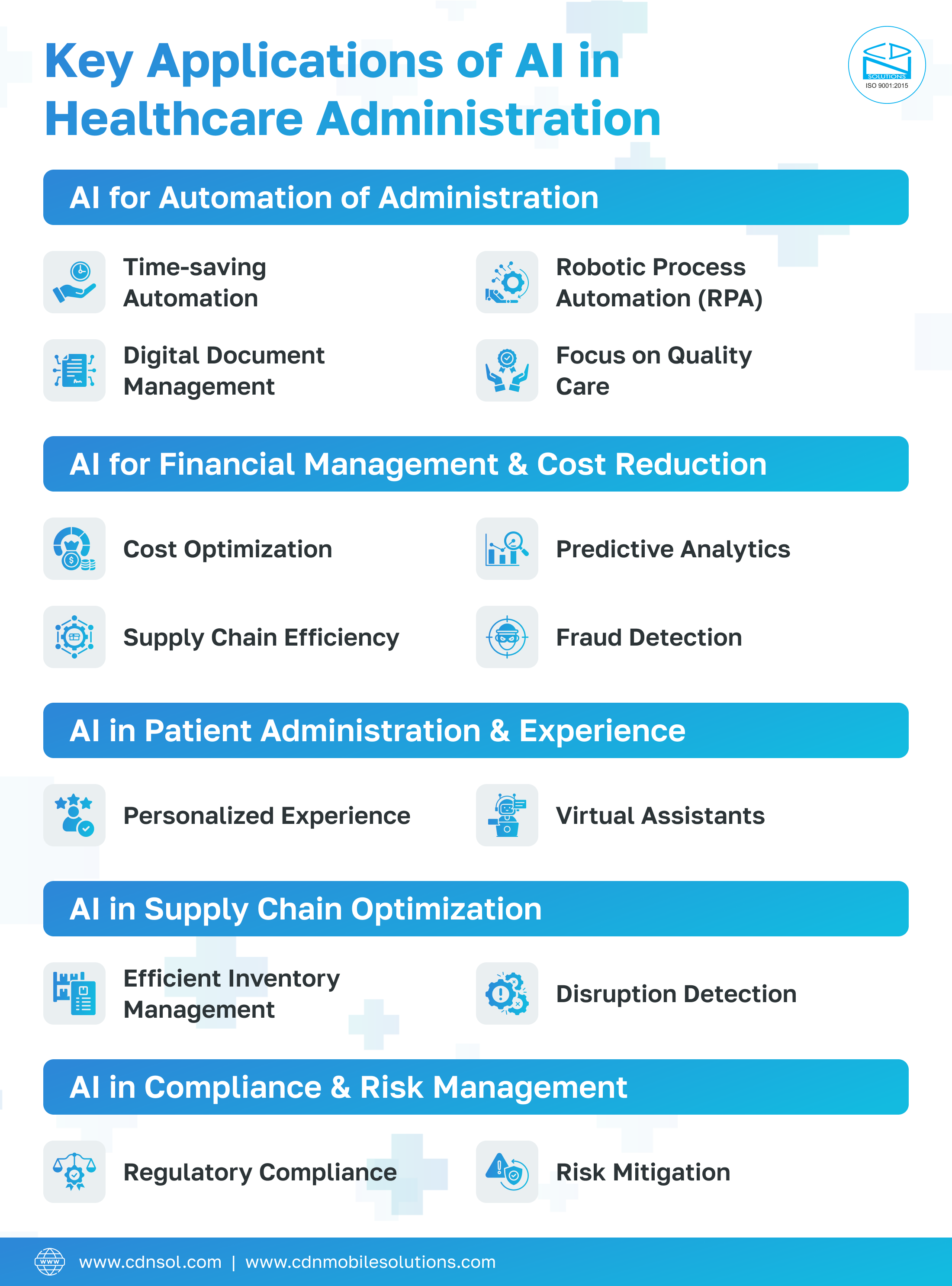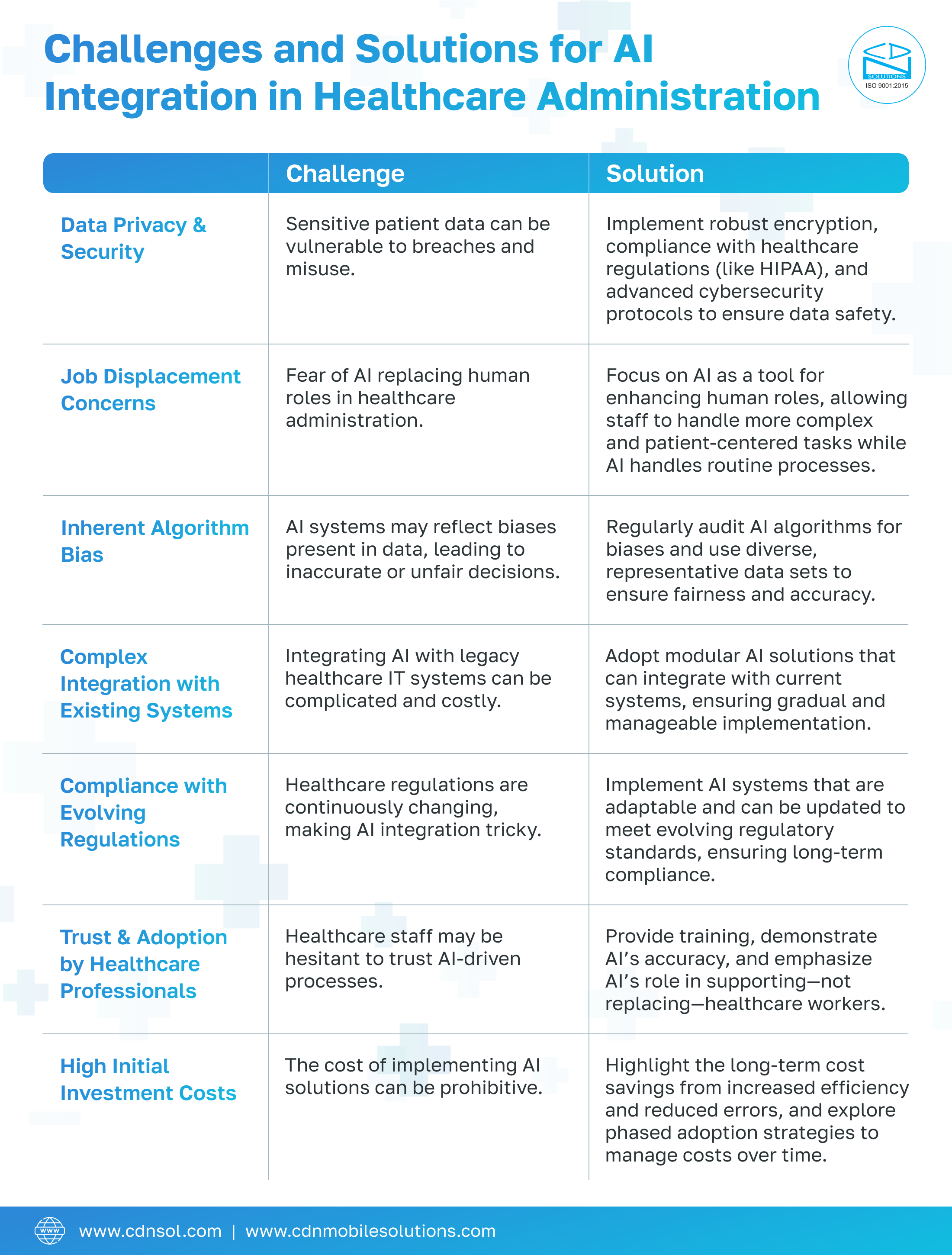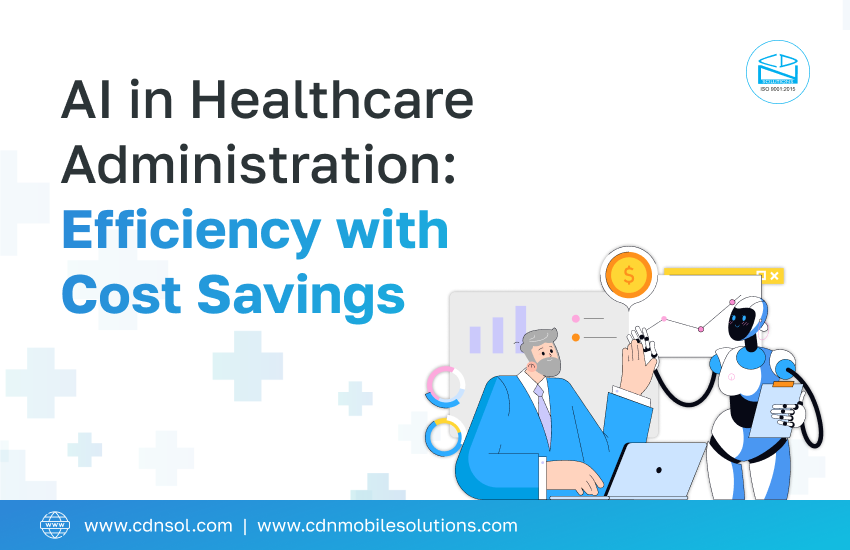The healthcare industry faces an ever-growing push towards achieving more with less expenditure. Indeed, administrative tasks, such as patient admissions and resource management, are time-consuming and costly processes. Artificial Intelligence proposes a few new approaches to such problems: automating basic tasks, optimizing resources, and optimizing patient care. This article will discuss how AI in healthcare administration is changing by bringing tangible benefits in terms of operational efficiency and cost reduction.
AI in health also goes that extra mile beyond the clinical applications, which play a major role in the administrative sector. Indeed, the many-faceted processes healthcare administration is made up of-such as scheduling, resource management, billing, and compliance-have improvements within AI. Varied AI technologies include machine learning, natural language processing, and predictive analytics, which will enable the automation of routine tasks, the reduction of human errors, thereby freeing resources for patient care.
Table of Contents
Key applications of AI in healthcare administration are:
- Automate tasks that are repetitive, such as billing or scheduling.
- Enhancing patient experience by the delivery of services at a personalized level.
- Optimization of resource and supply chain management.
Resource management in healthcare is very important, and for that, staff, medical equipment, and facilities have to be organized. AI-based tools can scan historical data, predict demand, and then optimally plan resource utilization. For example, predictive analytics will keep an eye on patient inflow, thereby helping the hospitals to make adequate staffing and equipment available.
AI in resource management can:
- Predict patient volumes for managing staff and other resources effectively.
- Minimize resource wastage by using proper equipment.
- Help in operational efficiency by predicting the peak period for admission and procedures.

AI for Automation of Administration
For a long time, medical administration has involved a lot of time and manpower in the fields of healthcare, such as billing, data entry, and claim processing. Artificial Intelligence now delivers a game-changing intervention through automation of these processes have their time usage reduced to a fraction with much-improved accuracy. Robotic Process Automation is also being put to wide use in patient scheduling, claims submissions, and invoice processing to free up administrative personnel to focus on higher value-added activities.
AI is changing the medical healthcare industry in a big manner, especially by automating administrative tasks. AI-powered solutions very comfortably manage and deal with these repetitive and time-consuming tasks involved in appointment scheduling, following up with patients, or even processing claims. By integrating the AI-powered system into operations, it is found that healthcare providers can manage the claims-processing area by cutting a lot of paperwork through digital document management solutions. It will not only enhance smoothness in operations but will also enable health professionals to channel their focus towards quality patient service.
AI for Financial Management and Cost Reduction
AI tends to offer enormous opportunities for cost savings. It analyzes financial data for inefficiencies, works on optimizing revenue cycle management, and identifies areas where operational costs can be reduced. Minimizing human errors, AI works to enhance the processes involved in reimbursement, hence making medical billing and coding more manageable and seamless. By automating administrative tasks AI assists healthcare professionals to focus more on patient care hence improving efficiency.
AI-powered predictive analysis allows hospitals and clinics to forecast demands, optimize staffing, and reduce unnecessary expenditures. AI also helps analyze large data sets to identify cost-saving opportunities without compromising the quality of healthcare services by enabling data-based decision-making. The AI-powered Supply Chain Management Solutions enable timely procurement of Medical supplies resulting in waste reduction and cost optimization. AI plays an important role in fraud detection by flagging unusual billing patterns or claim discrepancies ensuring compliance and preventing financial losses for healthcare organizations.
AI in Patient Administration and Experience
Patient administration epitomizes healthcare efficiency in record management, admissions, and scheduling. AI-driven platforms offer personalized experiences to patients by automating the admission process, optimizing appointment scheduling, and availing virtual assistants for general inquiries. These tools save not only time but also help with patient satisfaction because the services are seamless and timely.
Supply Chain Optimization with AI
The medical supply chain has its own set of challenges in the healthcare industry due to the huge complexity that comes with the buying and distribution process of medical supplies, pharmaceuticals, and equipment. AI offers a solution by optimizing the supply chain: having correct predictions of demand, efficiently managing inventories, and delivering key supplies on time. AI-driven platforms can further detect disruptions in the supply chain and identify alternative sourcing options so that required materials are available in hospitals when the need arises.
AI has immense potential to reshape healthcare supply chain optimization. First, it can offer highly accurate forecasts of the demand for medical supplies and, therefore, can enable a hospital to maintain optimum inventory levels without shortages. Certain procurement processes can be done by AI automatically, thus fostering a far better relationship with suppliers and smoothing the operations of the hospital. By leveraging the prowess of AI, hospitals can massively transform the efficiency of their supply chain while bettering patient care and resource optimization.
AI in Compliance and Risk Management
The two most salient features involved in healthcare administration relate to compliance with regulations and risk management. Artificial Intelligence plays a major role in enabling organizations to follow regulatory standards through constant monitoring of operations and identifying potential problems with expeditions. AI-driven systems help improve the management of risk by spotting trends that could result in medical errors, fraud, or patient safety. Early detection provides the administrator with ample opportunity to address and manage the problem well in advance.
AI will continue to transform the space of healthcare compliance and risk management by automating the compliance monitoring of various industry regulations, analyzing patient data for the reduction of medical errors, and detecting fraud by analyzing billing and claims patterns.

Challenges and ethical concerns with AI-driven healthcare:
- Data privacy and security concerns
- Possible job displacement of human workers
- Inherent biases within AI algorithms
Steps to overcome these challenges:
- Ensuring the privacy and security of patient data
- Striking a good balance between automation and human oversight.
- Proactive bias in AI algorithms
Read more: The Role of AI in Precision Medicine: Customizing Treatment for Better Outcomes
Future Trends in AI-Driven Healthcare Administration
As technology evolves, artificial intelligence will play a very relevant role in healthcare management. Several new AI trends have come onto the scene that are going to shape the future of healthcare. AI-assisted decision-making and predictive modeling have the potential to enable health managers to base their decisions on resource management and policy development on more grounds of evidence.
- The payoff will be significant gains in productivity and service to patients.
- More of the direct patient contact would be with AI virtual administrators.
- The more complex elements of care are liberated for professional clinicians.
- Predictive analytics would then be applied to plan resources more effectively and ensure that patients get the care that they need when they need it.
Conclusion
AI is going to replace health administration in such a way that it reduces costs while improving overall operational efficiency. From resource management to patient administration, AI-driven solutions are streamlining such processes and automating tasks to enable providers to give attention to high-quality care delivery. The challenges remain, particularly on ethical concerns and data privacy; however, the future of AI in healthcare administration is promising. More importantly, as technology continues to advance, AI will form the backbone of shaping efficient and cost-effective healthcare systems.
Next, we will cover how Predictive Analytics and AI are transforming patient monitoring and predictive Care. Keep reading to see more on the constantly evolving role of AI in healthcare!

